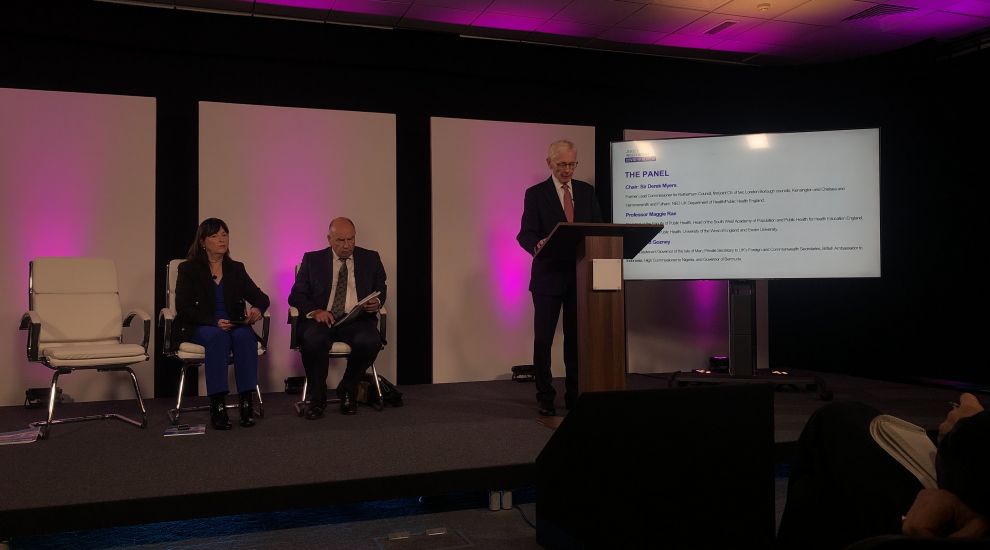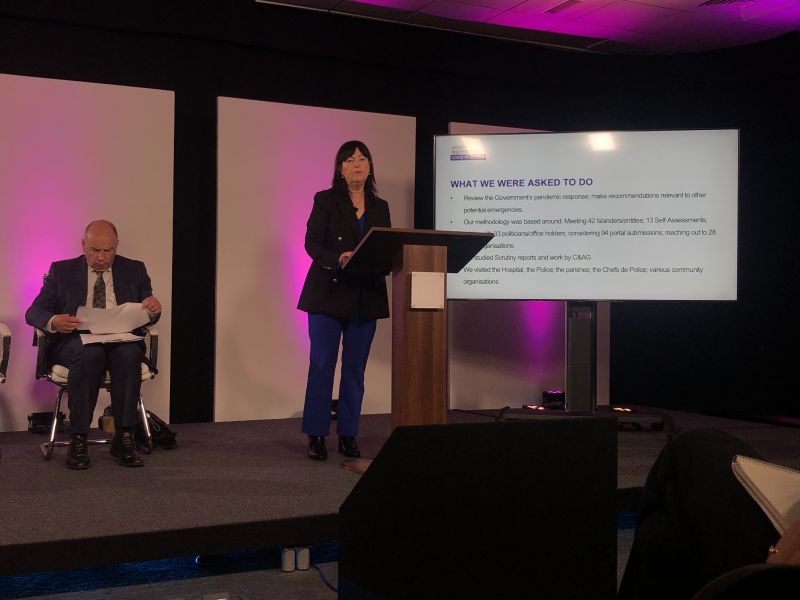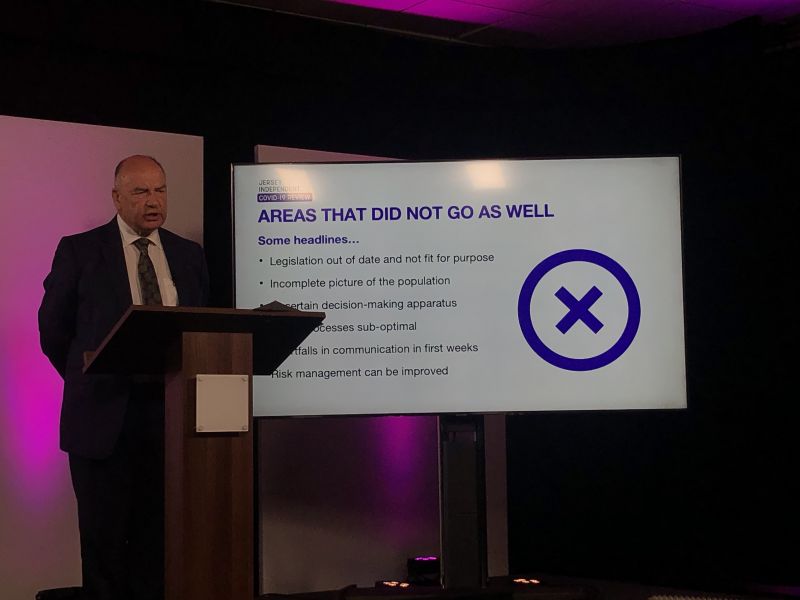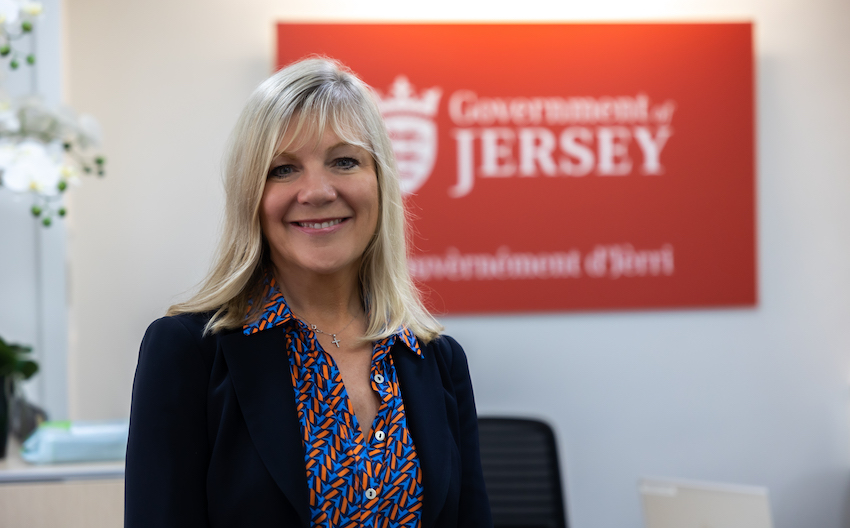


The Jersey Independent Covid-19 Review Panel has today published its final report into the response to the pandemic.
The independent panel, led by Sir Derek Myers with Professor Maggie Rae and Sir Richard Gozney, was commissioned in March 2022 to review the Government’s handling of the pandemic between February 2020 and January 2022.
It was the result of a proposition brought by St. Brelade Constable Mike Jackson, which States Members voted to support last year. A budget of £500,000 was approved by the States Assembly, but the panel reported today that they had delivered their findings "on time" using "only half" of the money allocated to the project.
Their report, which you can read online here, found that overall, the “Government did a good job” especially from a “less than ideal starting position”, but 16 recommendations were made into how the Government could be better prepared in future.

Pictured: Professor Maggie Rae thanked the wide variety of islanders who had contributed to the report.
Presenting the report this morning, Professor Maggie Rae described it as a “privilege to listen to people’s stories” and gain a “real understanding of what it was like to be here on Jersey, living through the [covid] experience”.
She thanked the wide variety of islanders who had contributed to the report and explained that it is important that the report recommendations are “relevant generically” and “not just to the pandemic” in case Jersey should have “another major incident which may have nothing to do with health”.
The Chair of the Review Panel, Sir Derek Myers said that while the Government could have had “more foresight, better leadership, better compassion and communication”, it is “difficult if not impossible” to track causal effects of any failings on the death rate.
He praised the Government for its successful helpline and community taskforces, as well as the businesses support schemes which were “developed at pace” and were unique to Jersey’s specific economy.
Commending the vaccination program, the Chair of the Review said that there was an understandable focus on those that were vulnerable and therefore keen to be vaccinated as soon as possible, but suggested that there could have “been more ambition” in encouraging some of the people who were less keen to get vaccinated.
Sir Derek also recognised the “strong” school response, which led to less days of closure than in other jurisdictions.
Focusing on the areas that need improvement, Sir Derek outlined three main focal points: prepare for threats, make decisions better, and improve communication.
He explained that Jersey “entered the pandemic with out-of-date legislation and a poor public health function” which he described as a “matter of regret”.
Going forward, Sir Derek recommended that the island “invest in emergency management when there isn’t an emergency” explaining that “rehearsal breeds better performance” and avoids “uncomfortable and dysfunctional” out-of-date legislation.

Pictured: Sir Derek Myers, Chair of the Review Panel outlines some areas for improvement.
The report also suggested that the time in between emergencies should be spent “sorting out data sharing” and ensuring that there is comprehensive information on the population of Jersey which is currently “not thorough”.
Professor Maggie Rae said: “To assess the needs of the population, you have to understand the population.”
Sir Derek also said that there were “short-falls” in the Government’s communication within the first few weeks of the pandemic which was “confusing and frightening” but admitted that communication “matured” as the pandemic went on.
The Chair of the Review explained that “the right level must be kept between concern and alarm”, describing public confidence as “the currency at which success is bought” during crises.
Although he did not want to criticise the “individuals who were brough together at short notice and did their best”, Sir Derek also said that the STAC processes during the pandemic were “sub-optimal”.
As a solution to this, the Review suggested the appointment of a Chief Scientist, perhaps on a part-time or voluntary basis, who is able to decide “what experts are needed to ensure that Jersey decision makers are given the best advice”.
The report also suggested that Jersey Care Commission “could have been a more alert listener to, and better advocate for, the needs of the sector it is responsible for”. Sir Derek added that the Care Commission was “too slow to change themselves from a regulator to a champion of their cause” which “would have made care homes feel as though they were doing a better” as staff “reported feeling quite isolated”.
The report also recommended that Jersey should consider strengthening its supply chain links with France, to avoid being “wholly reliant” on the UK and make plans for easier access to emergency supplies.
The panel’s discussions with members of community also revealed that young people felt that they were a neglected group, particularly those with frail self-esteem and mental health challenges. Further research also showed that the social behaviours of the elderly had not returned to normal since the pandemic and the report recommended that the Government should support community organisations to encourage this.
Sir Derek described the recommendations of the report as “not unaffordable” and “well within the comforts of the Government’s current plan”. When asked if he felt as though the current States Members were willing to engage with the recommendations, he said that the panel were “satisfied that no one will be in want of advice from our report” after having held six audiences with politicians to deliver the results.
He added: “If they want to listen then that is a matter for them, but we have now discharged our duty”.

Pictured: Government CEO, Suzanne Wylie.
The Government’s Chief Executive Officer, Suzanne Wylie, said: “I want to thank Sir Derek and the independent panel for delivering this report in a timely fashion.
“We remain mindful that 142 Islanders lost their lives to the pandemic and our thoughts are with their families and loved ones, as well as those families who were separated from loved ones for considerable periods and who faced many hardships.
“While the panel found that overall the Government did a good job, I am grateful for its recommendations, which will be presented to the Assembly and an action plan developed so that as an Island we can be better prepared in future.”
Follow Express for more detailed analysis...
Comments
Comments on this story express the views of the commentator only, not Bailiwick Publishing. We are unable to guarantee the accuracy of any of those comments.